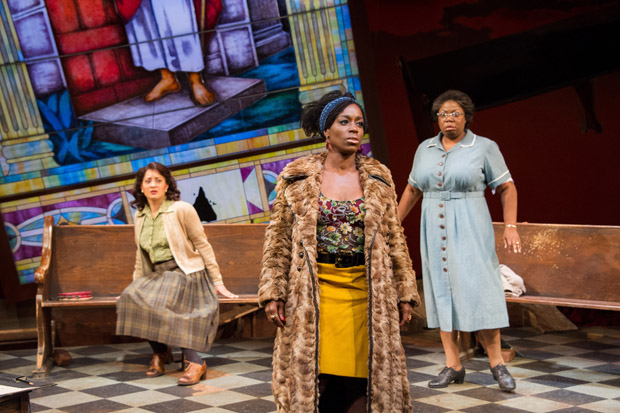Nina Simone: Four Women

(© c. Stanley Photography)
Most Americans know Nina Simone as the incomparable singer who could mingle jazz and Bach as she accompanied herself on the piano. But Simone had a totally different persona as well after September 15, 1963, when a huge explosion in the Birmingham, Alabama, 16th Street Baptist Church rocked America. Christina Ham's Nina Simone: Four Women weaves the story of four women into a musical that is currently being given a dynamic and moving East Coast premiere at Arena Stage.
Four little girls were lost in that terrible tragedy, but for Simone, the loss marked the beginning of a new life as well. After the bombing, she began to write or collaborate on a series of activist songs, the first of which was "Mississippi Goddam." Others included her version of "Sinnerman," "To Be Young, Gifted and Black," and "Four Women," all of which were intended to galvanize people into action over what she saw as the "too slow" pace of the civil rights movement.
The play is not structured solely around Simone's music, however. It also uses gospel songs, traditional hymns, and even a showtune that was one of the first songs that brought Simone to the public's attention at the beginning of her career: the Gershwins' and DuBose Heyward's "I Loves You, Porgy."
The play begins moments after the bombing. There are four women in the church sanctuary. Nina is the first. She spends a great deal of time talking to the second woman, Sarah, who is old and tired from working hard all day. When Simone is through finding out about Sarah, she turns to the third woman, a very light-skinned teacher named Sephronia, who has suffered all her life by not being accepted as either white or black. And when she is through grilling Sephronia, Simone turns to the fourth, a prostitute named Sweet Thing, who is pregnant with the baby of Sephronia's boyfriend.
Harriett D. Foy is a powerful representative of Simone, displaying her physical beauty, intelligence, and prodigious gifts as a singer and composer. Simone was known not to suffer fools gladly, and in this show she bullies everyone. But Foy demonstrates Simone's great talent for being able to aggravate others without becoming obnoxious. Theresa Cunningham is excellent as Sarah. She is proud of her blackness and her life of simplicity suits her just fine until Simone comes along and tries to get her all riled up about social causes. Cunningham makes credible the sweet, gullible Sarah, who is the antithesis of the hyper-civilized Nina.
Toni L. Martin is superb as Sephronia, who works as a civil rights organizer and has been beaten by the police so many times that she is incapable of bearing children. Martin's character is at first impressed by Simone, whom she has heard in concert, but dislikes her superior attitude. The final character is the feisty Sweet Thing, played by Felicia Curry as tough and street smart as she tries to get Sephronia to leave her man alone.
The differences in age, class, and social vision among the women create the spicy disagreements that make up the text of the play. In addition to doing a terrific job of guiding four performers, director Timothy Douglas keeps the show percolating by punctuating it with marvelous dances choreographed by Lady Dane Figueroa Edidi. Music director Darius Smith sits at a piano offstage, accompanying the women's songs. Timothy Mackabee's set captures the church just after the dynamite blast has leveled it. Pews are blown to the back wall of the sanctuary, a stained glass window is set on an unnatural angle, and fallen bricks are piled up at the sides of the stage.
This show is rich in historical and cultural detail about America in the 1960s. It will entertain both fans of Nina Simone and those who might not know much about the "High Priestess of Soul" and how her intense desire for African-American liberation helped define the music of the civil rights movement.











